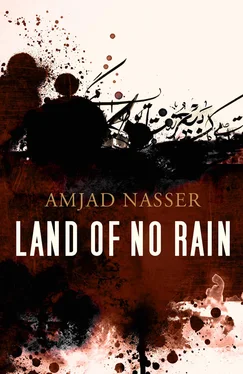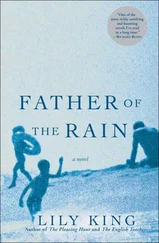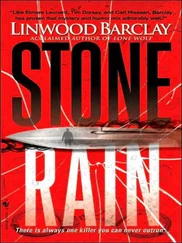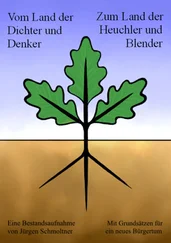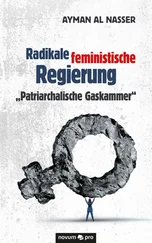Nasser Amjad - Land of No Rain
Здесь есть возможность читать онлайн «Nasser Amjad - Land of No Rain» весь текст электронной книги совершенно бесплатно (целиком полную версию без сокращений). В некоторых случаях можно слушать аудио, скачать через торрент в формате fb2 и присутствует краткое содержание. Год выпуска: 2014, Издательство: Bloomsbury Qatar Foundation Publishing, Жанр: Современная проза, на английском языке. Описание произведения, (предисловие) а так же отзывы посетителей доступны на портале библиотеки ЛибКат.
- Название:Land of No Rain
- Автор:
- Издательство:Bloomsbury Qatar Foundation Publishing
- Жанр:
- Год:2014
- ISBN:нет данных
- Рейтинг книги:4 / 5. Голосов: 1
-
Избранное:Добавить в избранное
- Отзывы:
-
Ваша оценка:
- 80
- 1
- 2
- 3
- 4
- 5
Land of No Rain: краткое содержание, описание и аннотация
Предлагаем к чтению аннотацию, описание, краткое содержание или предисловие (зависит от того, что написал сам автор книги «Land of No Rain»). Если вы не нашли необходимую информацию о книге — напишите в комментариях, мы постараемся отыскать её.
Land of No Rain — читать онлайн бесплатно полную книгу (весь текст) целиком
Ниже представлен текст книги, разбитый по страницам. Система сохранения места последней прочитанной страницы, позволяет с удобством читать онлайн бесплатно книгу «Land of No Rain», без необходимости каждый раз заново искать на чём Вы остановились. Поставьте закладку, и сможете в любой момент перейти на страницу, на которой закончили чтение.
Интервал:
Закладка:
That night you dreamt three or four consecutive and interwoven dreams, not all of which you now remember. You remember that you saw a thin young man with a droopy moustache standing in front of another young man, rather stouter, who was undoing his watch strap and offering the watch to the one with the long hair. He told him something you couldn’t quite understand, but judging by the expressions on their faces, as they stood under a cloudy sky, it sounded sentimental and moving. Then you saw a wreck of a man, with some of the features of the young man with long hair, wrapping his arms around the trunk of a cinchona tree, looking startled by something.
In those dreams, which were tangled together like a ball of wool, you heard a regular ticking, and you woke up.
IV
The museums in the City of Red and Grey contain many artefacts stolen from your country and its neighbours. Some of them are among the museums’ finest and most renowned acquisitions — the ‘sacred goat’ that was once a god, the vast obelisk that visitors see at the entrance to the great museum, the winged marble lions, the restored statue of the storm and rain god, the ‘spring palace’ that was removed in its entirety, and the stela on which the secrets of the first writing are engraved. But, apart from these objects, there are few things in the city that are connected with the world you come from. For a long time no trace of your old country has blown your way. You haven’t met anyone from your immediate family or any other relatives. As far as you know, no relative or childhood companion has come to the countries where you have lived or passed through. Your family doesn’t travel anyway, and the people in Hamiya in general don’t have a tradition of emigrating or travelling. The City of Red and Grey has no significant community of people from your country. There are people you sporadically come across at public gatherings, but you have started to avoid them, out of caution or irritation with their foolish rustic nostalgia. It never occurred to you to live in this city, where many years ago your region was dismembered like a cake at a birthday party. That never registered on the radar screen of your imagination. You came to the city by force of circumstance after your ship ran aground there. But sometimes, in the gloomy tunnels to the underground trains, you see large advertisements showing the desert, camels, bedouin encampments and oases with palm trees, and underneath, in bold type, this phrase that never changes: ‘The Land of No Rain’. You guessed that these tourism posters refer to your country, but they don’t mention the name. Although you doubt that camels and bedouin encampments exist in the way the adverts show, the basis for your guess that the posters refer to your country is the wall of volcanic rock that appears in shots of the oases. But there are similar volcanic rocks in neighbouring countries too.
* * *
Hamiya has an embassy in the City of Red and Grey, but it doesn’t do anything worth mentioning. It might as well not exist. Once, you remember, the embassy came out of its eternal slumber for the occasion of the historic visit of the Commander. It was because of his historic visit that you found out the embassy existed. You also found out that for many years it had done nothing but prepare for the visit, which was wrapped in secrecy until it was announced on his arrival at the airport. The Commander, by the way, was called ‘the Grandson’ for short, because his predecessors in the military dynasty were the Commander the Founder and then the Commander the Son, and the title ‘the Grandson’ never referred to anyone else in your country. He left his headquarters in Hamiya mainly for tours of inspection in the countryside or on the borders, and he rarely made trips abroad. The person who did that, when necessary, was his prime minister. It is said that the Grandson stuck to his office because he was frightened there might be a military coup against him, and also because he was a reclusive man uncomfortable mixing with others. But the prevalent view as to why he didn’t travel abroad was that he was too engrossed in working for security and stability. This entrenched idea about the Grandson and his devotion to your security annoyed you, especially when you became interested in public affairs. Once, in the presence of your father, you criticised the feeble terms ‘security’ and ‘stability’ — which the official press carried straight from the mouth of the Grandson — as being ‘imported ideas’, and even your father replied that the man dedicated his life to work and was not known to have any inclination towards luxury or leisure. ‘What’s not to like about that?’ he asked.
Then one day in the City of Red and Grey you suddenly found yourself face to face with Younis al-Khattat. The surprise almost undid twenty years of exile, with all the hardship and the homesickness, and restored things to how they were in the beginning.
With the passage of time and your wanderings overseas, you had almost forgotten Younis al-Khattat. You had forgotten his few poems, which were sometimes musical and sometimes grating, and you had completely forgotten the modernist metrical poetry of which he favoured the softest varieties. It’s true that he visited you in your dreams from time to time, but dreaming isn’t reality, as they say. Then, from beyond the walls of time and space, he popped up in front of you somewhere you didn’t expect a messenger or good news from your country. It wasn’t Younis al-Khattat in person that you met. That would not have been possible, because he never went beyond the borders of Hamiya. The one who crossed the border and left for other countries bore another name and was destined for other things. It wasn’t Younis himself but his works, or more precisely some of his poems. A prestigious cultural institution in the City of Red and Grey had organised an exhibition of the arts and literature of your region. It included contributions of variable quality and importance from various countries. It was an event that was unprecedented, as far as you know. The world you came from does not usually arouse such interest in a large and ancient conurbation whose secret life is dominated by money, sex, questions of security and fading imperial dreams. It’s the oil that gushes out of the region’s deserts that monopolises its attention. That’s the crux of the matter, as they say. Otherwise the region, which staggers under the burdens of the past and the pains of the present, which stretches — thirsty, hungry and humiliated — between the ocean and the gulf, does not exist on the map. Credit for this sudden interest in the world you came from must go to the suicide bombers that have given the people and the government such nightmares since the explosions of that bloody summer. It was the terrifying sequence of bombings, carried out by young men who paralysed a large city in broad daylight and amazed its inhabitants with their remarkable willingness to die, that made the elite take an interest in the principles and beliefs that inspired people to blow themselves up, along with other strangers. The bombings also gave the general public a phobia about people coming from a world wrapped in danger and mystery. Because life is dear in the City of Red and Grey, or at least it was before the plague broke out. In a way you find difficult to understand, it is cherished by those dying in hospital, by the blind with their sticks to guide them, and even by the destitute who call the streets their home. The inhabitants were terrified by what the prophet of the bombers said in his message to them: ‘We embrace death as you embrace life.’
The week-long exhibition was a mixture of older literature and arts, interspersed with some rather more contemporary culture. You heard of it by chance. You were living in a remote neighbourhood crowded with the poor — locals, immigrants and unemployed — and you seldom went to the city centre, which was noisy and busy. On one of your trips downtown, you saw a poster on a billboard in the main square, which was covered in the droppings of grey pigeons. The poster, inviting people to attend the exhibition, also appeared in the underground tunnels with their eerie lighting. It featured famous landmarks such as the Pyramids, the Pillars of Hercules and the Kaaba, alongside less well-known ones such as the place where Jesus was baptised, the Jalali and Mirani castles and the ruins of Mari, as well as fantastical drawings of men in large white turbans: perhaps distant ancestors such as Averroes, al-Hallaj or Haroun al-Rashid. The slogan on the poster was a saying current in the city: ‘It’s never too late.’ As you read the poster you said to yourself, ‘Perhaps it’s an attempt to make up for the past, or recognition that the world extends beyond the clock tower that marks the birth of time from the clammy womb of misty grey.’ But you were sorry that this sudden awareness of your world should have sprung from that apocalyptic summer, rather than from genuine curiosity or from an openness to find common ground, even common interests, without inhibitions or preconceptions. An awakening of that kind, if it had come about earlier, could perhaps have prevented the deep chasm that had now started to separate the two worlds. As you passed the poster, the words of which suggested a belated correction, you recalled a saying you had been surprised to hear from a politician rather than a poet or an acrobat: ‘The most dangerous strategy is to jump a chasm in two leaps.’
Читать дальшеИнтервал:
Закладка:
Похожие книги на «Land of No Rain»
Представляем Вашему вниманию похожие книги на «Land of No Rain» списком для выбора. Мы отобрали схожую по названию и смыслу литературу в надежде предоставить читателям больше вариантов отыскать новые, интересные, ещё непрочитанные произведения.
Обсуждение, отзывы о книге «Land of No Rain» и просто собственные мнения читателей. Оставьте ваши комментарии, напишите, что Вы думаете о произведении, его смысле или главных героях. Укажите что конкретно понравилось, а что нет, и почему Вы так считаете.
